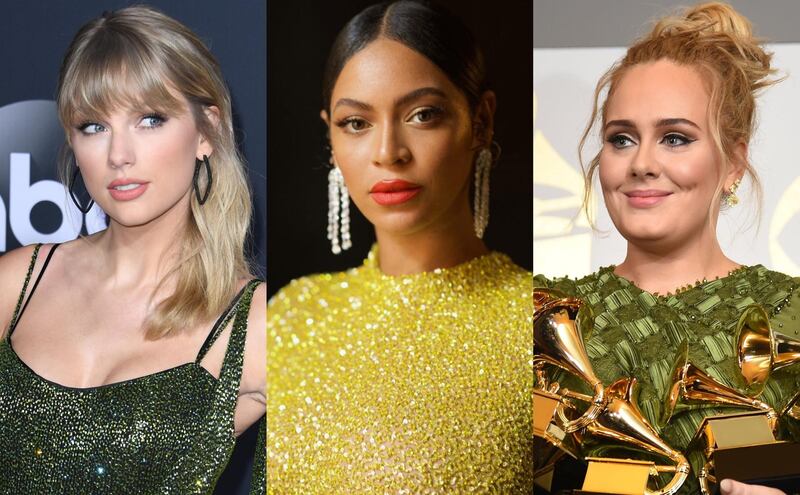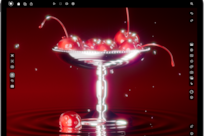For as long as records have been made, the ages in which they were pressed have been defined by strong female voices. That includes postwar jazz greats Billie Holiday and Ella Fitzgerald, Aretha Franklin and Joni Mitchell in the 1960s and 1970s, Madonna and Whitney Houston in the 1980s, and Britney Spears's bubblegum pop and Bjork's electronica experiments of the 1990s, and beyond.
But every era has only had space to anoint a handful of female stars, while men continued to dominate the airwaves. Here's a shocking statistic: of the 60 best-selling singles in the UK of the 1960s, only two were by a woman (Cilla Black and Mary Hopkin) and throughout the 20th century, female voices have commanded only a fraction of the attention afforded their male counterparts.
Worse still, women have historically been played against each other, such as the feud between Mariah Carey and Jennifer Lopez, with the tacit implication that the charts only have space for one pop queen at a time – a marketing trend tackled head on last year by Bebe Rexha's Women in Harmony meal.
But as we look back on the past decade, it's clear at last, thankfully, this is all in the past. Of the top 20 bestselling singles in the UK of the 2010s, exactly half – 10 songs – featured a female voice. These 10 female superstars have each left an indelible mark on music over the past 10 years and will be remembered for many more to come. The most bittersweet, simple proof? Compiling this list was both too easy and painstakingly difficult. It was necessary to make some harsh, and often quite arbitrary, choices. It really didn't need to stop at 10.
Adele
If we're going to start somewhere, then let's begin with the undisputed queen of the airwaves in the 2010s: A is most certainly for Adele. As author of two of the decade's best-selling albums – 21 (2011) and 25 (2015), with collective worldwide sales of 54 million – Adele's voice has been inescapable these past 10 years, whether Chasing Pavements or hollering from "the other side". No slur intended, Adele's gift is a voice so simultaneously naked and powerful, in both lyric and projection, it's crossed boundaries and generations. It's something your mum likes as much as a stuffy broadsheet critic. Oh, and the body positive benefits of what at the time was such an unlikely success story will reverberate for decades.
Beyonce
And now we move inevitably on to the one and only Queen B, a talent so emphatically individual she hijacked the world's coolest festival. If the 2010s are remembered for one concert, it might as well be "Beychella", the two nights Beyonce headlined last year's Coachella festival, leading a 100-strong cast through a meticulously choreographed conceptual suite, commemorated in the film Homecoming.
That show was the summation of a peerless career that began two decades ago with Destiny's Child, but reached its artistic peak with two albums so universally praised, Beyonce (2013) and Lemonade (2016), that it remains impossible to choose between them.
Billie Eilish
This year has been delightfully scarred by the sudden arrival, seemingly from nowhere, of Billie Eilish – the bedroom "terror-pop" prodigy tearing up charts, collecting a shelf full of awards, baffling critics and attracting breathy praise from self-serious rock stars Thom Yorke and Dave Grohl. She only turns 18 tomorrow. Released in March, Grammy-nominated debut album When We All Fall Asleep, Where Do We Go? was described as the year's best album by diverse sources including The New York Times and Consequences of Sound – and takes second place from Billboard and Rolling Stone. It's sure she'll have plenty more to say as she enters adulthood.
Lady Gaga
Her latest reinvention as the rough-hewn soul-rock voice of A Star is Born (2018) – most evident in the weepy Bradley Cooper duet Shallow – might prove the moment she both let the guard of her mystique down and embraced an unthreatening mid-career move into the entertainment establishment. But what a way to turn a new page – who could have imagined that 2008's plastic, peroxide Poker Face would be unmasked so dramatically a decade later?
Lana Del Rey
The delightful enigma of Lana Del Rey was announced in 2011 with Video Games and Born to Die, two searing singles that contrasted bold lyrical imagery with cinematic strings and electronic inflections. The parent Born to Die album, which was released the following year, solidified the New Yorker's status as the queen of Americana-steeped yet future-facing baroque pop. Divisive at the time, it's been critically reassessed as a classic, listed as third best album of the decade by The Independent. Del Rey's voice has only matured since, with her latest album – an ambitious masterwork targeting gun violence and climate change – already topping more than 10 best album of the year lists.
Lorde
Remember when dream pop prodigy Lorde came out of nowhere (well, New Zealand) at the age of 16 with the 2012 anthem Royals? The precursor to the phenomenon of debut album Pure Heroine, her smouldering, restrained voice – and its wizened takedowns of contemporary culture – spoke to, and for, the generation we'd soon call Gen Z. Follow-up Melodrama, released in 2017, solidified Lorde's song-writing smarts and earned critical plaudits for its blend of electropop stylings with a distinctly post-millennial melancholy – but you imagine the best is still to come.
Rihanna
If Beyonce's pop culture shadow has any rival, it's surely Rihanna. Although, it must be stated, Rihanna squarely slays the sales battle, having shifted more than 270 million records – Madonna is the only solo female to claim more – with Beyonce selling about 100 million. This has truly been Rihanna's decade, beginning with the high of omnipotent earworms such as We Found Love, which was a Calvin Harris collaboration, but capped by the comfort zone-pushing maturity of 2016's Anti album. She memorably brought the tour for the record to the Abu Dhabi Grand Prix that year for one of the greatest pop spectacle's the city has ever seen.
Solange
Five years younger than her sister Beyonce, Solange may have had stints in Destiny's Child and released two overlooked albums, but few paid her due attention until the sudden appearance of 2016's pointedly named A Seat at the Table, a staggeringly accomplished neo-soul triumph that last month Vice declared the album of the decade. This year's more cosmically inclined follow-up When I Get Home might be better, and its live stage show – an artful theatrical suite unfolding on several layers – was among the most original and arresting on tour this year.
St Vincent
A short fork away from the uber-mainstream success of the other names on this list, there's an alternative history chronicling the incredible wealth of female electronic auteurs who've made bold and inventive pop statements this decade – including Robyn (see Body Talk, 2010), Janelle Monae (check Dirty Computer, 2018) and Grimes (either Visions, 2012, or Art Angels, 2015). But future-pop princess St Vincent tops the lot with decade highs that include 2012's David Byrne collaboration Love This Giant and 2017 album Masseduction, which The Guardian and The New York Times called that year's best.
Taylor Swift
After three albums of adolescent country, Swift's "imperial phase" was declared with 2012's crossover smash Red, culminating in the majesty of 1989 (2014), the soundtrack to a million thwarted teenage romances. Reputation (2017) hinted at hidden depths (and despairs), while this year's Lover was a defiant return to making shiny, melodic, pop music as digestible as it is relatable. The best-selling US artist of the decade, Swift's arc of success is the era's loudest and proudest.





